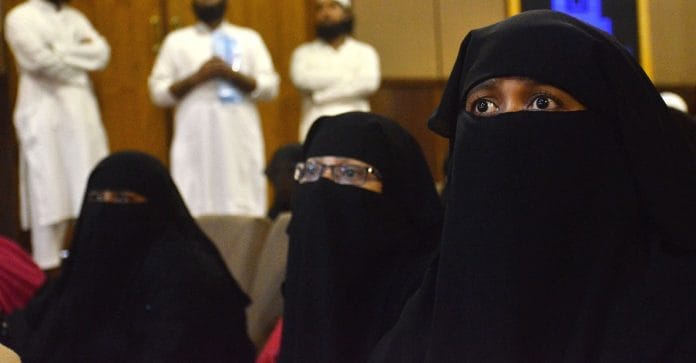In ‘Muslim Women Speak: Of Dreams and Shackles‘, activist-scholar Jamil tries to find these women’s real voices, instead of just presenting them as victims.
Fatima reads her Quran when her alcoholic father goes out for his daily jaunt. In public, the 15-year-old ‘woman’ can always be seen clad in a burqa. Does that make Fatima a devout Muslim or a victim first? She regrets having to drop out of school and take on the extra job of zari making. She quarrels with her mother about it. Is that a suggestion of Fatima’s latent feminism?
Ghazala Jamil’s analytically robust account of Muslim women is infused with voices of young women wrestling with Jamil across various workshops. They are trying to gain control over the narrative of their own lives from the oppressive and hegemonic stereotypes of women as victims. Worse even, the notion that Muslim women are victims of a special kind.
Chiselled over 10 chapters, the development worker, activist and scholar in Ghazala Jamil together fight her battles with scholarship on multiple fronts. As the cover from Baaraan Ijlal’s installation Birdbox suggests, the project tries to uncover and unshackle young Muslim women in discovering their real voices aside from their popular representation of them as victims.
First, Jamil takes on Indian feminists. She criticises their inability to imagine the experience of womanhood in the grips of minoritisation and marginality. By imposing an imaginary ‘universality’, they subsume religious, sensual, intolerant, para-civilised and violent specificities, to conceptualise an ‘Indian sisterhood’. Such broadstroke feminism, she observes, subsequently fails to account for communally charged alienation of Muslims in India.
From there, she directs her attention to methodological failures in academia, journalism and activism. They continually subject Muslims to quantitative enquiries, failing to unravel the qualitative complexities and multiplicities of Muslim lives. This is evident in the obvious lack of theoretical insights into Muslim lives.
This, she charges, is symptomatic of a global malady that tends to imagine Muslims worldwide as a singular category, indolently conflating religion with civilization.
Further, she tries to situate her work on intimate aspirations by trying to tease out a backdrop of national imaginary that forms an alternative to western imperialism. Following Gopal Guru’s arguments, Ghazala Jamil goes on to assert that theory making is a social responsibility. It restores agency to those deemed powerless and therefore is emancipatory, transformative and a political project in articulating an identity.
Jamil disavows the very notion of authentic knowledge and instead chooses to take recourse to Donna Haraway’s “situated knowledge”. She argues that the “worth of being an insider or outsider may be judged in its ability to deliver”. Thus, she adopts a novel method of engaging in workshops with her interlocutors where they play an active part in generating knowledge about their own lives.
In doing so, Jamila manages to excavate her interlocutors’ views on what they imagine as taking action or acts of agency. Within such a field of agency, silence, hesitation, tears and inaction begin to speak as loud as words do. She exposes her readers to a world of experience beyond words; adding rich denseness of experiences or marginality.
It is from this vantage point that Ghazala Jamil begins to delve into the dreams and aspirations, the shame and humiliation of young Muslim women in India. For instance, criticising quantitative studies that reduce aspirations to solely that of socio-economic status, Jamil attempts to broaden the horizon of aspirations to include educational status and career goals of young Muslim women.
The study also goes on to examine the simultaneously impeding and encouraging influence of faith and family attitude, gender roles, intimate relationships, socio-cultural and political milestones on aspirations of these young women.
Yet the cumulative effect of communalism and poverty infected patriarchy is that daughters often tend to grow up motherless. They seek motherly affection and protection in their marriages. This often does not fructify under the effect of communal violence that collides into their lives long after an incident itself.
Arpita Phukan Biswas holds a Ph.D. in Sociology from the Indian Institute of Technology-Bombay.






